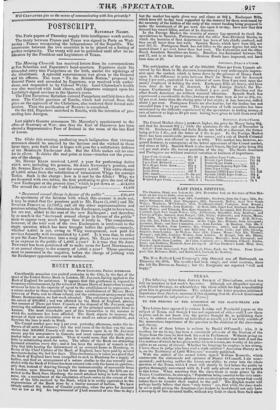The Globe this evening, professing much indignation that virtuous statesmen
should be assailed by the factious and the wicked in these latter days, puts forth what it hopes will pass for a satisfactory defence of the Monteagle Exchequer Job. But the Globe makes out no case for its client. It shirks the real point at issue—touches not the grava- suet of the charge.
Mr. HENRY ELLIS received 1,400/. a year for performing duties which now, including his pension, Sir JOHN NEWPORT'S pension, and Mr. SPRING RICE'S salary, cost the country 4,400/. This extra charge of 3,400/. arises from the substitution of immaculate Whigs for corrupt Tories. Such is the charge : how is it met by the Globe? Why, we are favoured with two tables, the first professing to give the cost of the
"new Exchequer at the present time," which is put down at /34,080 The second the cost of the " old Exchequer" 44,489
"Decreased annual charge in favour of the public" £30,409 As specimens of the fairness with which this account is made out, it may be stated that the pensions paid to Mr. Elam (1,400/.) and Mr. SPENCER PERCEVAL (2,700/.), and all the other superannuations and pensions arising from the alteration in the Exchequer, ought to have been, but are not, added to the cost of the new Exchequer ; and therefore by so much is the "decreased annual charge in favour of the public" made to appear very much larger than it really is. The comparison, however, of the total cost of the two Exchequers is irrelevant to the single question which has been brought before the public,—namely, whether 4,400/. is not,. owing to Whig management, now paid for services formerly well remunerated by 1,400/. Is it true that, in order to put Sir Jons NEWPORT into a snug place, Mr. Elam was removed at an expense to the public of 1,400/. a year ? Is it true that Sir JOU31 NEwronr has been pensioned off to make room for Lord Mosrmacrx, at an annual charge to the country of 1,000/. a year ? These questions must be answered in the negative, before the charge of jobbing with the Exchequer appointments can be refuted.


























 Previous page
Previous page